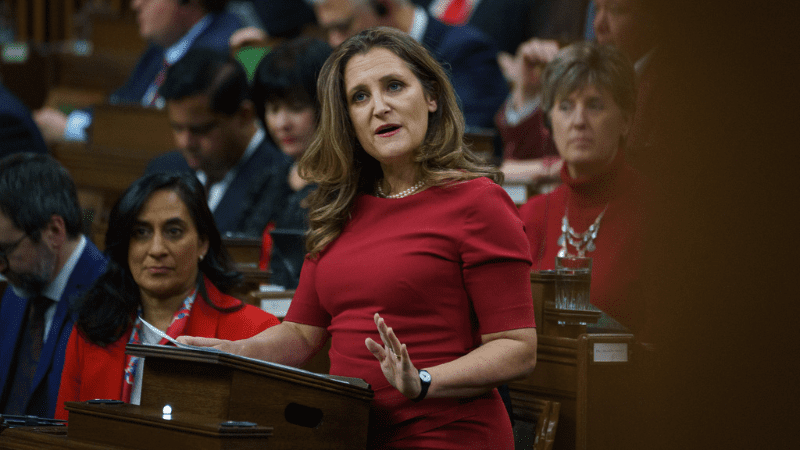This article originally appeared in the National Post.
By Philip Cross, April 16, 2024
The 2024 federal budget represents a continuation of the Trudeau government’s orgy of spending financed by debt and higher taxes.
It is obviously bad economics, so much so that it is hard to treat it as a serious attempt at coherent economic policymaking. Years of debt-financed government spending and rising taxes have resulted in what is now widely-acknowledged as a national productivity crisis. With low investment and productivity hampering potential output, the Bank of Canada estimates the economy is within 0.5 to 1.5 percentage points of its capacity limit.
Bank Governor Tiff Macklem has said provincial government spending already is making it harder to lower inflation. Running federal deficits of 2 percent of GDP—on top of shockingly large provincial deficits in Quebec, Ontario and British Columbia— is irresponsible. Deficit spending when inflation is above target violates the 1991 accord between the Government of Canada and the Bank of Canada that “jointly set forth targets for reducing inflation” and requires both parties collaborate to achieve that goal.
Besides being bad economics, the government’s massive spending is bad politics because it antagonizes most provinces without any obvious electoral return from its spending.
Much of the spending, such as national dental and pharmacare and a lunch program for 400,000 school children, intrudes on provincial control of health care and education. Federal meddling in the province’s sandbox stokes regional grievances in a federation where national unity is often fragile. Justin Trudeau took power in 2015 promising “sunny ways,” a term former Prime Minister Wilfrid Laurier coined to describe how he would negotiate a compromise solution to an explosive language controversy in Manitoba’s education system. Former prime minister Stephen Harper soothed regional squabbling by not intruding into most areas of provincial control, concentrating more on federal priorities such as national defence and bank regulation.
Instead of seeking “sunny ways” to reduce regional tensions, Trudeau has steadily aggravated them. It began in 2016 when the provinces resisted his prod to spend more on home care and mental health, given they already were struggling to provide basic health services such as a family doctor. He alienated western provinces by constantly erecting roadblocks to their energy industries, while imposing an unpopular carbon tax that the courts narrowly ruled was constitutional despite provincial jurisdiction over natural resources. Now all provincial budgets for social services and housing are feeling the strain from surging immigration, which the federal government implemented without proper co-ordination with the provinces.
Partly as a result of unwelcome federal intrusion into provincial domains, Canada is markedly less united than in 2015, with resurgent western alienation and Quebec separatism. As a result, the federal Liberal party was wiped out in Alberta and Saskatchewan in the 2019 election, while conservatives regained control in Alberta’s provincial election.
Meanwhile the Bloc Quebecois recovered from near-extinction to win the second-most seats in Quebec, building on the nationalist (if not separatist) CAQ party’s 2018 provincial election victory. Worse, a rejuvenated Parti Quebecois today leads in the polls, promising yet another divisive referendum on separation in its first term in office.
Facing an historic defeat at the polls, Trudeau reflexively has returned to his 2015 platform of higher spending financed by deficits and taxing better off Canadians (one hesitates to call them rich when compared to truly wealthy people in the United States). This ignores the adage that sitting governments lose elections more than the opposition wins them.
Trudeau came out ahead in 2015 because of national fatigue with Harper, not because of the Liberal’s fiscal agenda. Moreover, the public’s mood has changed after years of higher government spending and deficits that began in 2015 and reached a crescendo during the pandemic. A clear majority of Canadians now say that government spending and deficits are too high as their everyday concerns shifted to the high cost of living and interest rates, issues that were not pressing in 2015.
For nearly a decade, Canadians have watched the worsening inefficiency and outright wastefulness of federal spending initiatives. These include the faltering and uncoordinated roll-out of national child care and dental programs, repeated attempts to improve conditions for Aboriginals (partly negated by the government’s hostility to natural resources, which are often the only development possible in remote rural regions) or subsidizing electric battery manufacturers for a product that is faltering in the marketplace.
The budget’s school lunch program is a reminder that over a million kids have poor nutrition, despite the government’s boast that its 2016 Canada Child Benefit (CCB) significantly lowered child poverty. Either the CCB did not reduce poverty as claimed or the real problem is not low income but bad parenting, which government transfers alone cannot solve. All of this spending has been poorly administered by the rapidly swelling ranks of civil servants, who are increasingly unresponsive to the notion of public service.
Rather than duplicating Trudeau’s 2015 electoral success, the daily announcement of billions of dollars of federal spending leading up to the budget is more likely to replicate former Premier Kathleen Wynne’s futile last minute attempt to buy the Ontario electorate in 2017. Wynne’s steady drumbeat of government initiatives only reminded voters how little they had to show for over a decade of profligate spending and deficits, and her Liberal party tumbled to third place where it remains today. The federal government’s attempt at vote-buying is unlikely to fare much better, leaving a sad legacy of a divided country and a faltering economy.
Philip Cross is a Senior Fellow at the Macdonald-Laurier Institute.






